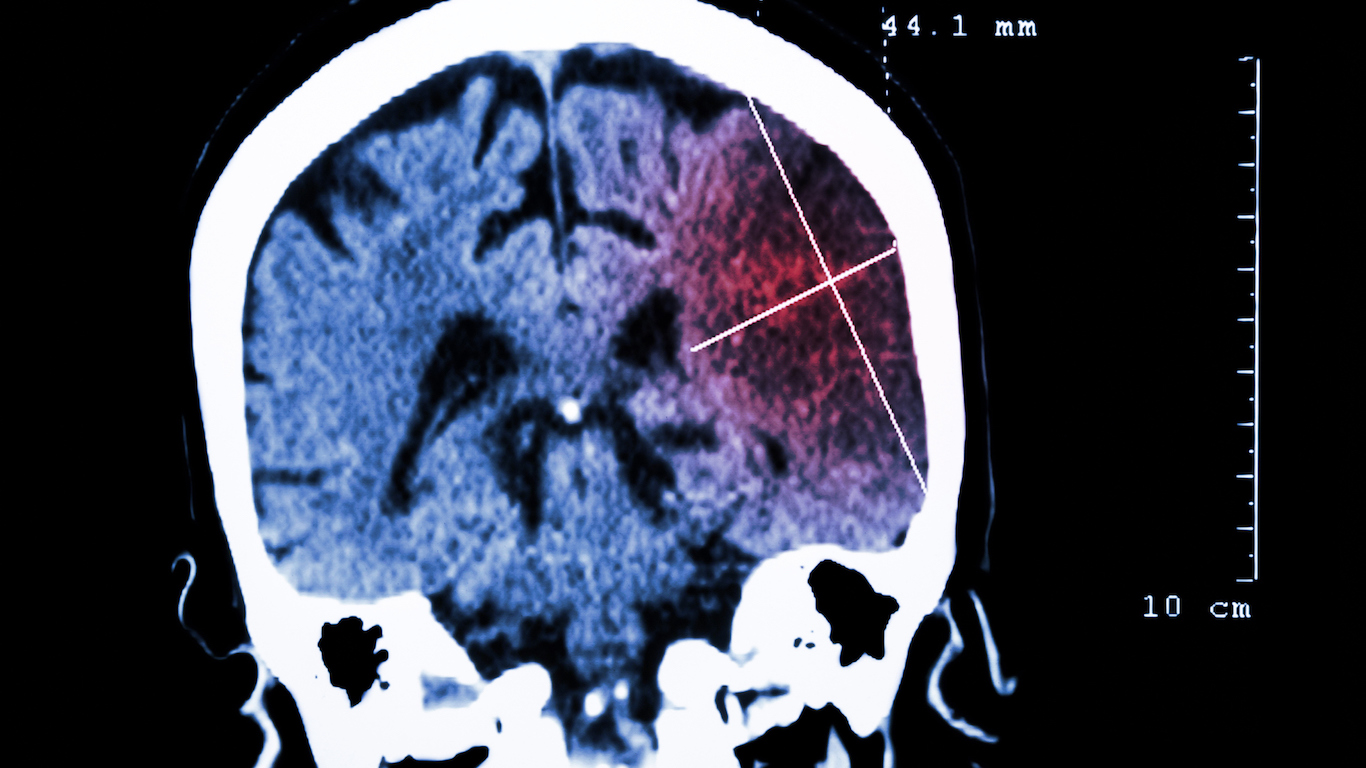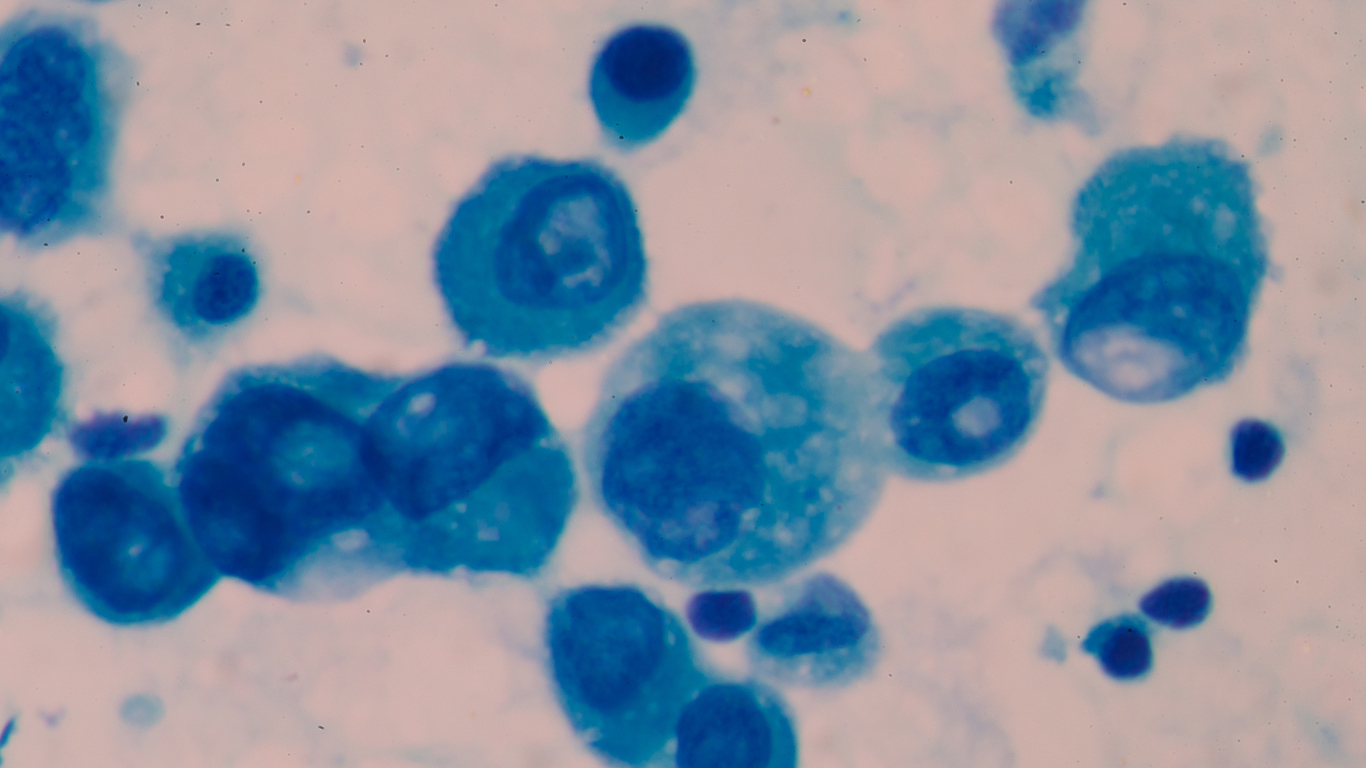
More than half of all Americans between the ages of 45 and 75 use aspirin, according to a study published in the American Journal of Preventive Medicine. The drug’s popularity is attributable to its wide range of uses, from reducing a fever to treating a headache to preventing a stroke or heart attack.
Though the drug as we know it today was invented in a laboratory in Germany in 1897, humans have been using the drug’s medicinal properties for millennia. The ancient Greeks used some of aspirin’s active ingredients as early as around 400 B.C.
[in-text-ad]
While many of aspirin’s uses have been known for decades if not centuries, new uses are still being discovered. 24/7 Tempo reviewed some of the most serious and common ailments that are either treatable, or preventable, with aspirin.
One of aspirin’s most important functions is as an analgesic — or pain reliever. Just like some of these effective pain treatments that aren’t opioids.
While over the decades many other pain relievers have been made available over-the-counter — including those containing acetaminophen and ibuprofen — aspirin remains a popular option for pain relief.
Aspirin is also often used for its anti-inflammatory properties. Inflammation is the root cause of several conditions, including muscle aches and several types of arthritis.
Aspirin is also commonly used for its anti-platelet blood-thinning properties. Heart attack and stroke are two of the most common causes of death in the United States, and aspirin can greatly reduce the risk of both. Since strokes are caused by blood failing to reach the brain, and heart attacks are caused by blood failing to reach the heart, aspirin’s ability to thin blood and prevent it from congealing can greatly reduce the likelihood of such conditions in many of those at risk.
Heart attack and stroke, which are most common in these states, are not the only deadly diseases aspirin can help and prevent and treat. Several multi-decade studies have suggested that a low-dose aspirin regimen can reduce the likelihood of developing certain types of cancers and also increase the likelihood of survival among those undergoing treatment for certain types of cancer.
While many consider aspirin to be a miracle drug, it is not a cure-all. Though aspirin is an effective tool to fight and prevent the most common type of stroke, it can significantly worsen the effects of a different kind of stroke. In more rare cases, strokes are caused by bleeding in the brain, a condition that aspirin’s blood-thinning properties can worsen. Medication’s negative effects have led to some of the worst drug recalls in history.
Aspirin can also cause gastrointestinal bleeding in some cases. People should always check with their doctor before taking aspirin.
To identify the conditions that can be treated or prevented with aspirin, 24/7 Wall St. spoke with physicians and consulted data from the Mayo Clinic and Centers for Disease Control and Prevention. Our list is comprised of some of the most common and some of the most deadly conditions and ailments treatable with aspirin.
Click here to see the 11 medical conditions that Aspirin can treat.

1. Heart disease
Annual U.S. cases: 715,000
Heart disease kills about 610,000 Americans a year, making it the leading cause of death in the United States — and these are the state with the most heart disease.
A heart attack, one of the most serious complications of heart disease, can be prevented with aspirin. Because heart attacks can be caused by blood clots that restrict blood flow to the heart, aspirin’s anti-platelet blood-thinning properties can greatly reduce the risk of a heart attack in at-risk individuals. They often take a low daily dose of the drug, and those suffering from a heart attack can limit damage by taking the drug as first-aid.
[in-text-ad]

2. Colorectal cancer
Annual U.S. cases: 145,000
The U.S. Preventative Services Task Force announced in April 2016 that aspirin can reduce the risk of colorectal cancer in certain individuals. The multi-decade studies demonstrated that among those with a specific hereditary condition that puts them at greater risk of colorectal cancer those who took aspirin reduced their risk by 63% compared to those taking a placebo. The benefits also extend to those at average risk of colorectal cancer. Some researchers believe we are only beginning to fully understand aspirin’s potential role in fighting cancer, which is most common in these states.

3. Inflammation
Annual U.S. cases: 54.4 million (arthritis)
Aspirin’s anti-inflammatory properties make it an effective treatment for a number of common ailments. While inflammation is the body’s way of protecting itself from infection from foreign viruses and bacteria. However, it can also damage the body’s tissues and cause pain. Inflammation without a real virus or bacteria often manifests as one or more forms of arthritis, which affects millions of Americans. Aspirin can reduce pain associated with osteoarthritis, rheumatoid arthritis, psoriatic arthritis, and muscle aches.

4. Preeclampsia
Annual U.S. cases: 8% of all pregnancies
Preeclampsia is a condition that can occur during pregnancy. Preeclampsia can cause damage to the blood vessels as well as kidneys, and if left untreated can be fatal to both the mother and the fetus. Preeclampsia is often characterized by increased blood pressure about 20 weeks or more into pregnancy, even in women with relatively normal blood pressure. A low-dose aspirin regimen is often used as a preventative measure for at-risk women.

5. Tension headaches
Annual U.S. cases: >3 million
Headaches are one of the most common medical conditions in the world, affecting roughly 1-in-20 adults on a daily basis. One common type of headache is a tension headache, characterized by a dull, aching head pain and tenderness in the neck and shoulders. Though the exact cause of tension headaches are unknown, many researchers believe they are related to heightened emotions and stress. (This is the most stressed out city in every state.) As a pain reliever, aspirin is one of many over the counter medications that can effectively treat tension headaches.
[in-text-ad]

6. Breast cancer
Annual U.S. cases: 268,600
Recent studies suggest that aspirin can increase the likelihood of survival among those suffering from a number of cancers, including breast cancer. While there is less doubt regarding aspirin’s benefits to patients with other types of cancer, such as colorectal, a low dose aspirin regimen during the course of the cancer treatment can improve chances of survival for patients with breast cancer.

7. Fever
Annual U.S. cases: >3 million (influenza)
Fever, or high body temperature, is a symptom of a number of infections, including the flu and common cold. Along with several other over-the-counter medications, including those containing acetaminophen and ibuprofen, aspirin can be an effective way to reduce a fever. Many Americans likely associate fevers with the seasonal flu, an infection that affects millions of Americans each year and one that may have surprising and serious health complications.

8. Stroke
Annual U.S. cases: 795,000
Strokes are one of the leading causes of death and the leading cause of adult disability in the United States. Most strokes occur when blood flow to a part of the brain is cut off. The reduced blood flow deprives the brain of oxygen and kills cells in whatever part of the brain is affected. Because of aspirin’s anti-blood clotting properties, many stroke victims are given aspirin upon arrival at the hospital to reduce the likelihood of another stroke.
In rarer instances, strokes are caused by ruptured blood vessels in the brain. In these cases, aspirin is to be avoided as the very properties that make it an effective treatment for strokes caused by clotting can make bleeding more severe. Stroke is a risk factor for coronary heart disease, and these are America’s heart disease capitals.

9. Prostate cancer
Annual U.S. cases: 176,000
Like many cancers, relatively little is known about the causes of prostate cancer. It is the second most common form of cancer among men.
Though the findings are not 100% conclusive, it appears a low-dose aspirin regimen while undergoing cancer treatment can reduce the likelihood of death among patients with prostate cancer.
[in-text-ad]

10. Migraine
Annual U.S. cases: >3 million
A migraine is an especially severe headache characterized by throbbing pain, often only on one side of the head. People suffering from a migraine are often hypersensitive to light and sound and can find the pain debilitating, making them too sick to work.
Migraines can have many triggers that can range from stress to food additives. The root cause however, is the aggregation of blood platelets, which can often be prevented with aspirin.

11. Common cold
Annual U.S. cases: >3 million
According to the CDC, there are millions of cases of the common cold in the United States each year. While there is no cure for the common cold, as a pain reliever aspirin is an effective way to treat some of the cold’s often debilitating symptoms such as aches and fever. Children and teens should not take aspirin to treat these symptoms, however. According the Mayo Clinic, aspirin has been linked to Reye’s syndrome, an extremely rare condition, which lead to premature death. And these are the states with the most premature death.
100 Million Americans Are Missing This Crucial Retirement Tool
The thought of burdening your family with a financial disaster is most Americans’ nightmare. However, recent studies show that over 100 million Americans still don’t have proper life insurance in the event they pass away.
Life insurance can bring peace of mind – ensuring your loved ones are safeguarded against unforeseen expenses and debts. With premiums often lower than expected and a variety of plans tailored to different life stages and health conditions, securing a policy is more accessible than ever.
A quick, no-obligation quote can provide valuable insight into what’s available and what might best suit your family’s needs. Life insurance is a simple step you can take today to help secure peace of mind for your loved ones tomorrow.
Click here to learn how to get a quote in just a few minutes.
Thank you for reading! Have some feedback for us?
Contact the 24/7 Wall St. editorial team.
 24/7 Wall St.
24/7 Wall St. 24/7 Wall St.
24/7 Wall St.



